Masayuki Yui
Nascimento : 1947-09-21, Kanagawa Prefecture, Japan
História
Masayuki Yui was born in 1947 in Kamakura, Kanagawa, Japan. He is an actor and writer, known for Ran (1985), Kagemusha (1980) and Dreams (1990).

Gankane-san
Cicada is the story of Jumpei-- a man who loses sight of his progeny when he finds out he is infertile, but then is given the gift of clairvoyance and begins to see glimpses of the future. These glimpses lead him to a series of cicada shells, which become symbolic of his desire to shed his old self. Though his lineage ends with himself, Jumpei starts anew as a father-figure to his sister's young son.
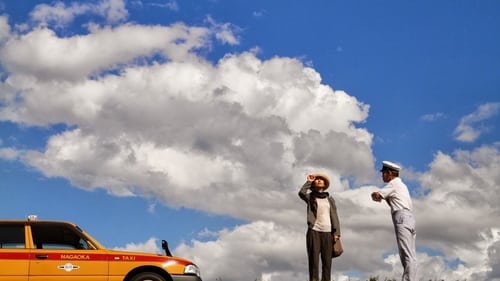
In 2011, a journalist arrives in Nagaoka, a Japanese village that underwent destruction during both World War II and the 2004 Chūetsu earthquakes, and is now notable for the fireworks it launches annually in memory of the victims of war. She is there for two reasons: firstly, to learn about the experiences of Nagaoka's inhabitants, and secondly, to watch a stage play written by an enigmatic student of her ex-boyfriend, which depicts the bombing of the city during WWII.

Hasegawa
Tamotsu is expecting a persimmon to dry and yet he cannot accept that it is time for a man on his deathbed to die. As the persimmon mysteriously, or supernaturally, holds out from drying, so Tamotsu tries his hardest to keep the man alive. Only when Tamotsu has let go can the persimmon take its natural course.

Ohba
A talented but troubled Edo Period swordsman, Kanemi Sanzaemon. Three years earlier, Kanemi killed a woman, Renko, the corrupt mistress of the powerful daimyo Tabu Ukyou. Unexpectedly, Kanemi received a lenient sentence for his crime and is allowed to return to his clan after only one year of imprisonment. Following his return, Kanemi is faced with the death of his wife, Mutsue. Thereafter, Kanemi lives with and cares for his wife's niece, Satoo, who has secret affections for Kanemi and expresses them by helping change his bleak outlook on life. Meanwhile, Kanemi's develops his unique "bird-catching" sword technique which he will soon put to test in battle for the first time against the fearsome swordsman, Hayatonosho Obiya.

Old Man
A co-worker confronts Mamoru on his apparent apathy toward life, and this results in Mamoru leaving his job out of humiliation. Now alone and without work, just as it seems that things could not possibly get worse, parts of Mamoru's bicycle begin to disappear, one by one. In frustration, Mamoru leaves a note for the thief, begging him to just take the whole thing. The note left in response is signed God, leaving Mamoru only more confused. At last, when the only remaining piece of the bicycle is a lonely bell, Mamoru receives an envelope, containing addresses at which each piece of the bicycle might be retrieved.

When poverty-stricken Korean-Japanese (Zainichi) discover there is valuable iron ore in the rubble of a destroyed shantytown they plan to haul it out for profit. Amidst this plan there is discrimination, war and an infatuation between a man and a woman, but like everything around them there and owing to the forces around them, there is as much chance that these may burn to ashes and be destroyed or be the beginning of something new.

Producer
Documentary made by Toho for the Masterworks reissue of all of its Kurosawa films. This one focuses on "Dodes'ka-den" (1970).

Writer
Documentary made by Toho for the Masterworks reissue of all of its Kurosawa films. This one focuses on "Dodes'ka-den" (1970).

Producer
Documentary made by Toho for the Masterworks reissue of all of its Kurosawa films. This one focuses on “Ran” (1985).

Writer
Documentary made by Toho for the Masterworks reissue of all of its Kurosawa films. This one focuses on “Ran” (1985).

Producer
Documentary made by Toho for the Masterworks reissue of all of its Kurosawa films. This one focuses on "The Lower Depths" (1957).

Writer
Documentary made by Toho for the Masterworks reissue of all of its Kurosawa films. This one focuses on "The Lower Depths" (1957).

Producer
Documentary made by Toho for the Masterworks reissue of all of its Kurosawa films. This one focuses on "The Bad Sleep Well" (1960).

Writer
Documentary made by Toho for the Masterworks reissue of all of its Kurosawa films. This one focuses on "The Bad Sleep Well" (1960).

Producer
Documentary made by Toho for the Masterworks reissue of all of its Kurosawa films. This one focuses on "Stray Dog" (1949).

Writer
Documentary made by Toho for the Masterworks reissue of all of its Kurosawa films. This one focuses on "Stray Dog" (1949).

Producer
Documentary made by Toho for the Masterworks reissue of all of its Kurosawa films. This one focuses on "Kagemusha" (1980).

Writer
Documentary made by Toho for the Masterworks reissue of all of its Kurosawa films. This one focuses on "Kagemusha" (1980).

Producer
Documentary made by Toho for the Masterworks reissue of all of its Kurosawa films. This one focuses on "Ikiru" (1952).

Writer
Documentary made by Toho for the Masterworks reissue of all of its Kurosawa films. This one focuses on "Ikiru" (1952).

Producer
Documentary made by Toho for the Masterworks reissue of all of its Kurosawa films. This one focuses on "Throne of Blood" (1957).

Writer
Documentary made by Toho for the Masterworks reissue of all of its Kurosawa films. This one focuses on "Throne of Blood" (1957).

Producer
Documentary made by Toho for the Masterworks reissue of all of its Kurosawa films. This one focuses on "The Hidden Fortress" (1958).

Writer
Documentary made by Toho for the Masterworks reissue of all of its Kurosawa films. This one focuses on "The Hidden Fortress" (1958).

Producer
Documentary made by Toho for the Masterworks reissue of all of its Kurosawa films. This one focuses on "High and Low" (1963).

Writer
Documentary made by Toho for the Masterworks reissue of all of its Kurosawa films. This one focuses on "High and Low" (1963).
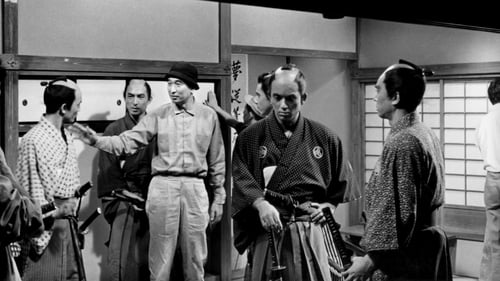
Producer
Documentary made by Toho for the Masterworks reissue of all of its Kurosawa films. This one focuses on "Sanjuro" (1962).

Writer
Documentary made by Toho for the Masterworks reissue of all of its Kurosawa films. This one focuses on "Sanjuro" (1962).

Producer
Documentary made by Toho for the Masterworks reissue of all of its Kurosawa films. This one focuses on "Yojimbo" (1961).

Writer
Documentary made by Toho for the Masterworks reissue of all of its Kurosawa films. This one focuses on "Yojimbo" (1961).

Producer
Documentary made by Toho for the Masterworks reissue of all of its Kurosawa films. This one focuses on "Seven Samurai" (1954).

Writer
Documentary made by Toho for the Masterworks reissue of all of its Kurosawa films. This one focuses on "Seven Samurai" (1954).

Narrator
Documentary made by Toho for the Masterworks reissue of all of its Kurosawa films. This one focuses on "Seven Samurai" (1954).

Narrator
Documentary made by Toho for the Masterworks reissue of all of its Kurosawa films. This one focuses on "Yojimbo" (1961).

Narrator/Interviewer
Documentary made by Toho for the Masterworks reissue of all of its Kurosawa films. This one focuses on "Ikiru" (1952).

Narrator
Documentary made by Toho for the Masterworks reissue of all of its Kurosawa films. This one focuses on "Kagemusha" (1980).

Narrator
Documentary made by Toho for the Masterworks reissue of all of its Kurosawa films. This one focuses on "The Hidden Fortress" (1958).

Narrator
Documentary made by Toho for the Masterworks reissue of all of its Kurosawa films. This one focuses on "High and Low" (1963).

Narrator
Documentary made by Toho for the Masterworks reissue of all of its Kurosawa films. This one focuses on "Dodes'ka-den" (1970).

Narrator
Documentary made by Toho for the Masterworks reissue of all of its Kurosawa films. This one focuses on "Sanjuro" (1962).

Narrator
Documentary made by Toho for the Masterworks reissue of all of its Kurosawa films. This one focuses on "The Bad Sleep Well" (1960).

Narrator
Documentary made by Toho for the Masterworks reissue of all of its Kurosawa films. This one focuses on "The Lower Depths" (1957).

Narrator
Documentary made by Toho for the Masterworks reissue of all of its Kurosawa films. This one focuses on "Stray Dog" (1949).

Narrator
Documentary made by Toho for the Masterworks reissue of all of its Kurosawa films. This one focuses on "Drunken Angel" (1948).

Narrator
Documentary made by Toho for the Masterworks reissue of all of its Kurosawa films. This one focuses on "Throne of Blood" (1957).
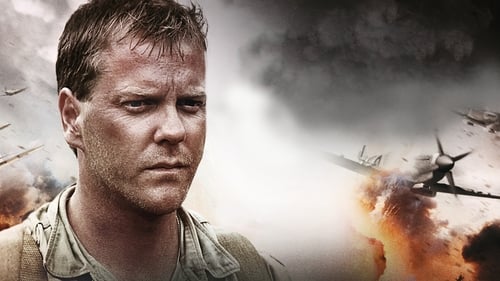
Captain Noguchi
No auge da 2ª Guerra Mundial, Cingapura é invadida por tropas japonesas. Um pequeno grupo de soldados é levado a uma prisão no coração da selva da Birmânia. São forçados a construírem uma ferrovia através da traiçoeira mata selvagem. A fuga se torna prioridade, mas quando o Coronel McLean, é brutalmente assassinado pela Guarda Imperial, o grupo fica sem um líder

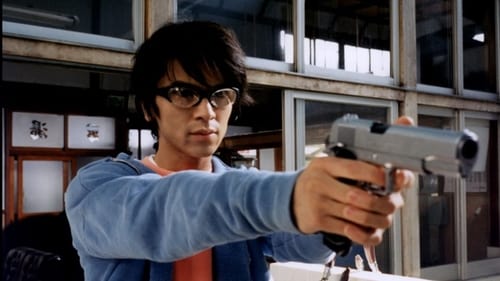
Manager of beauty parlor
Tóquio, final do século. A polícia está atrás de um misterioso criminoso chamado "Quatro-Olhos", um justiceiro solitário que persegue suas vítimas com estranhos óculos que deformam sua visão. Enquanto o policial Roy (Tetta Sugimoto) é confundido pelos ataques aleatórios, sua irmã mais nova, Hinano (Hinano Yoshikawa), entediada com seu trabalho, decide assumir o papel de investigadora usando seu astuto conhecimento das ruas e trens da cidade para seguir o misterioso homem. Mas, quando a suposta ameaça à sociedade se revela um belo rapaz da sua idade (Shinji Takeda), obcecado por discos, games e que sai pela cidade com uma filmadora gravando tudo o que vê, Hinano tenta o entender e vai simpatizando com aquelas atividades à medida que vai se apaixonando pelo jovem.
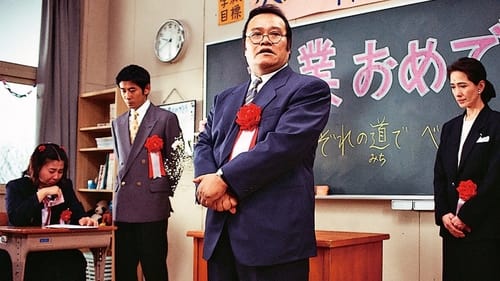
The story follows the teacher and students of the Ryubetsu Handicapped High School.
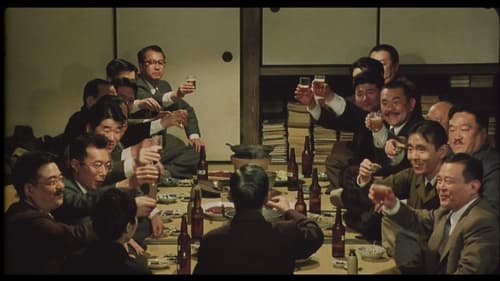
Kiriyama
Considerado um dos melhores diretores de todos os tempos, Akira Kurosawa encerra suas realizações cinematográficas com esta obra-prima perfeita, Madadayo. O filme segue as duas últimas décadas de Hyakken Uchida, um escritor e professor que se aposenta nos anos da guerra, no início dos anos 40. Seus alunos o veneram e todos os anos fazem um ritual de aniversário chamado “Mahda-kai? (Está pronto?)” para que Uchida beba um grande copo de cerveja e responda “Madadayo! (Ainda não!)”, reconhecendo que a morte pode estar próxima, mas que a vida continua. (e 10 - Estimado 10 Anos)

Member of climbing team
Produção japonesa que apresenta uma série de curtas-metragens do diretor Akira Kurosawa. Um dos segmentos mostra um menino espionando a cerimônia de um casamento de raposas, enquanto que em outra história, um jovem é testemunha de um momento mágico no jardim. Muitos dos filmes estão interligados através de um tema ambiental.
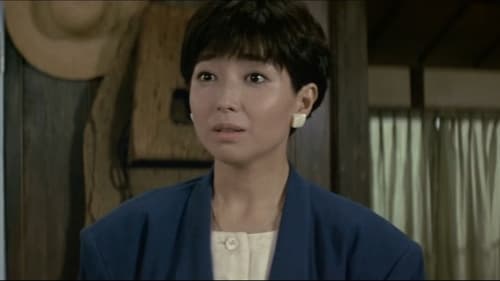
When his travels take him to rural Hokkaido, Tora-san helps a cantankerous old veterinarian (Mifune) in his relationships with his estranged daughter, and a woman in whom he is secretly interested.

Tango Hirayama
No Japão medieval, um velho senhor da guerra se aposenta, entregando seu império a seus três filhos. No entanto, ele subestima amplamente como o novo poder irá corrompê-los. O senhor de guerra japonês Hidetori Ichimonji decide que chegou o momento de se aposentar e dividir seu feudo entre seus três filhos. Seus filhos mai velho e do meio, Taro e Jiro, concordam com sua decisão e prometem apoiá-lo nos dias restantes de aposentadoria. O filho mais novo, Saburo, discorda de todos eles argumentando que há pouca probabilidade dos três irmãos permanecerem unidos. Insultado pela impaciência de seu filho caçula, o senhor da guerra o expulsa. Quando o senhor da guerra começa sua aposentadoria, ele rapidamente percebe que seus dois filhos mais velhos são egoístas e não têm intenção de cumprir suas promessas. Isso leva à guerra e só o banido Saburo pode salvá-lo.
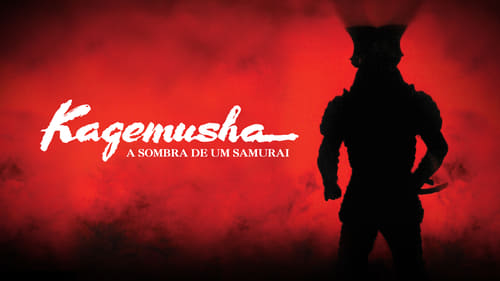
Ieyasu Tokugawa
Shingen, um poderoso Senhor da Guerra, seriamente ferido, ordena ao clã que use algum sósia para o substituir caso faleça - para manter a sua morte em segredo, evitando assim o ataque dos seus inimigos. Mas este é um vulgar criminoso que tem de aprender a transformar-se num grande líder e comandar um exército de 25.000 leais guerreiros Samurai…



















































